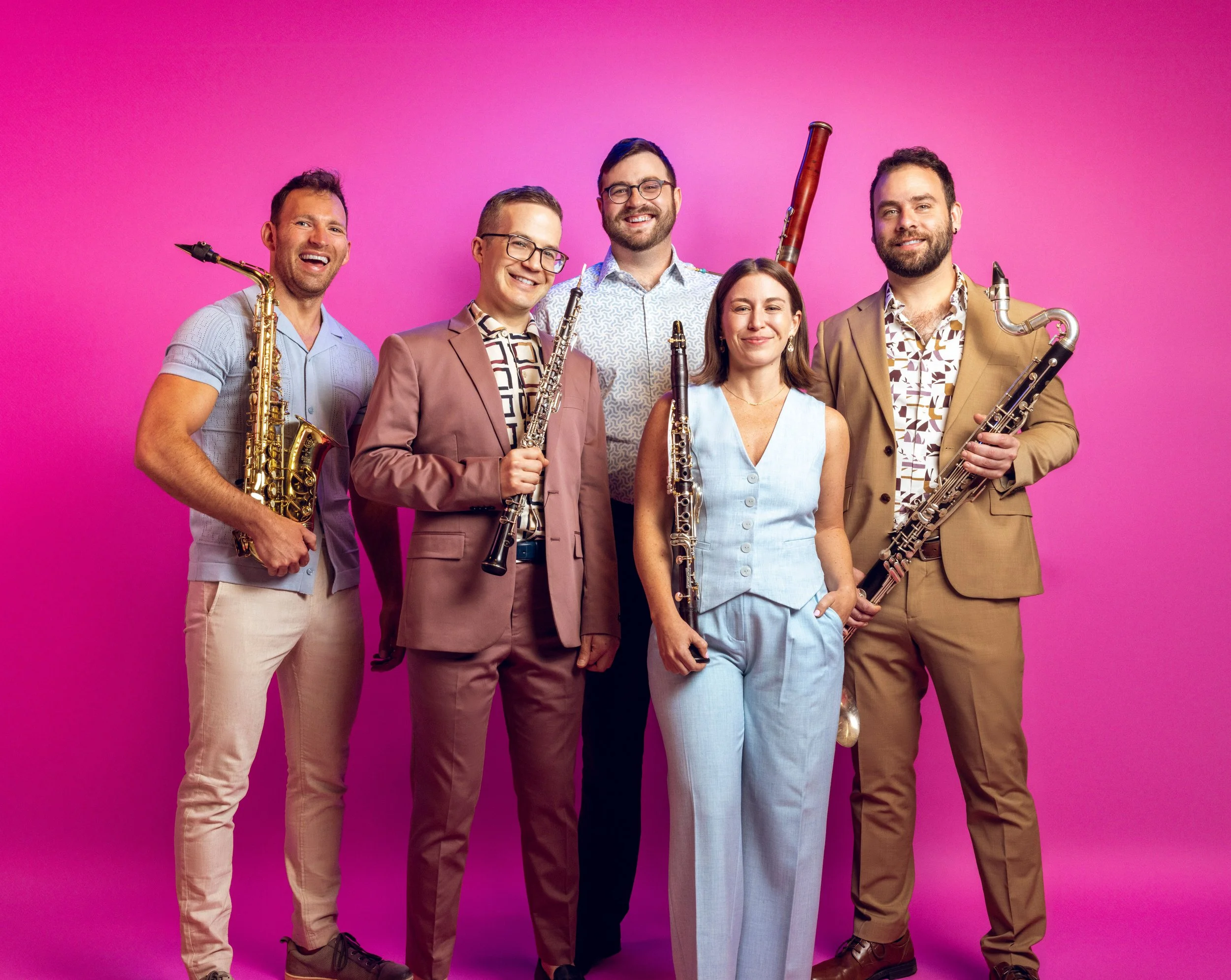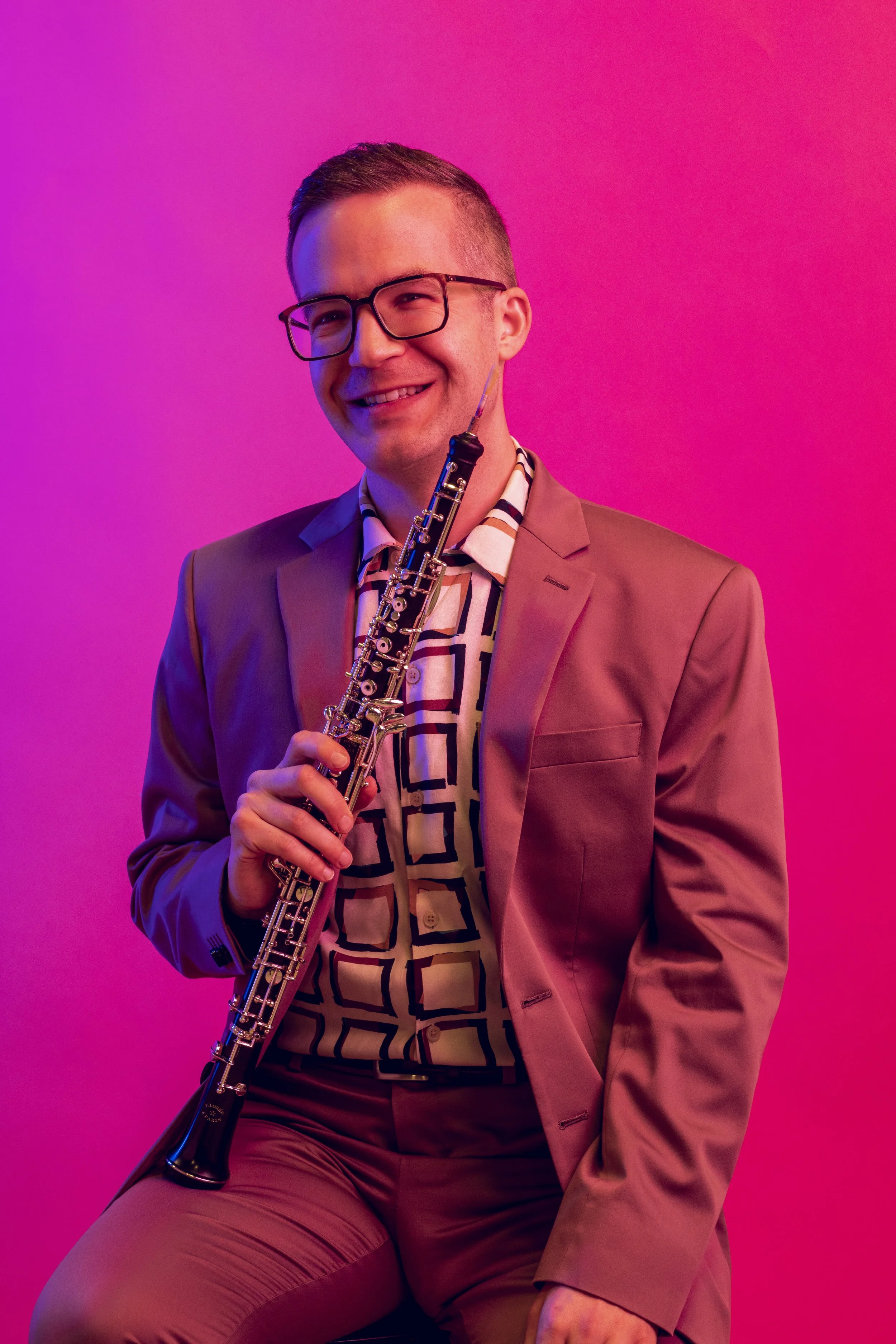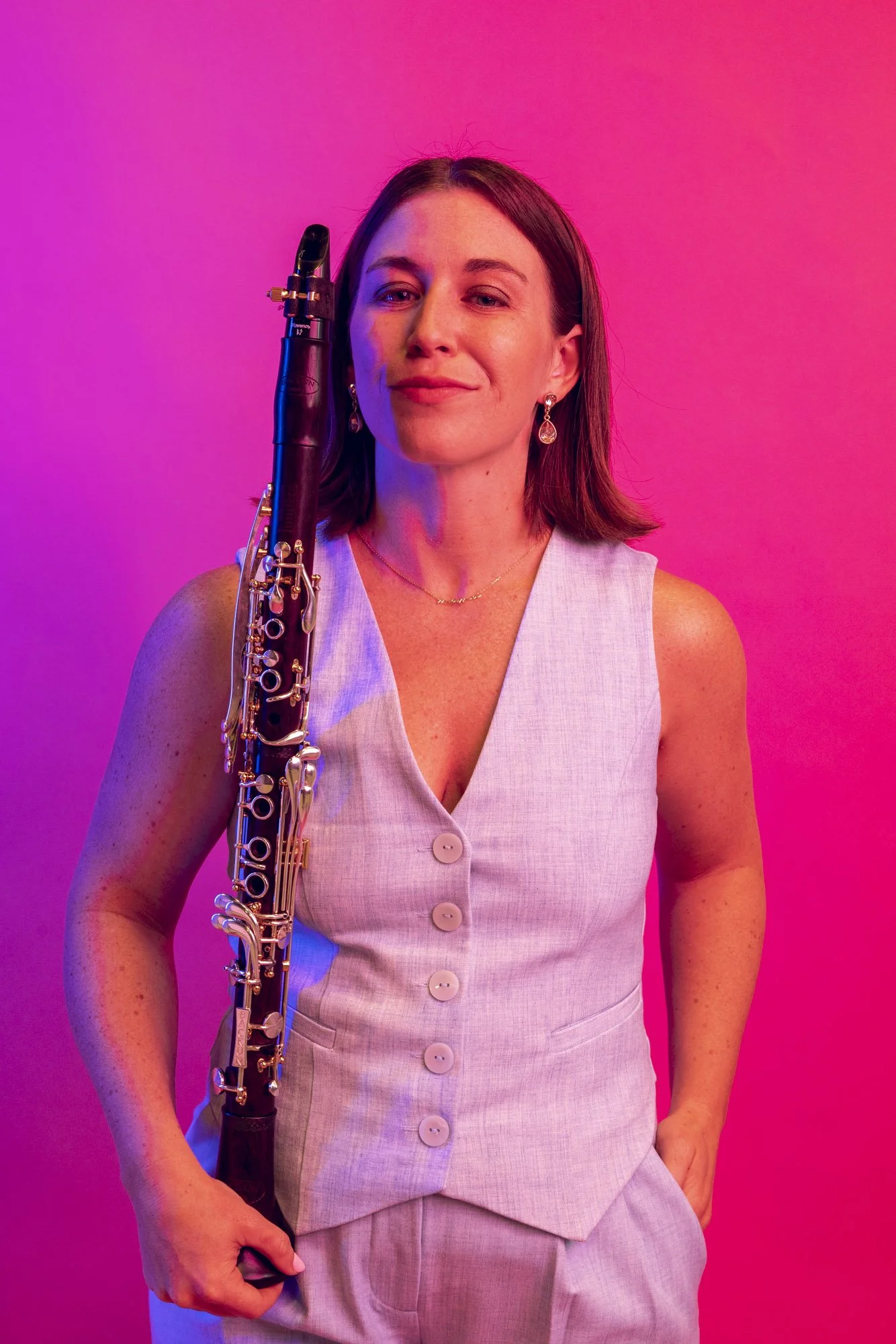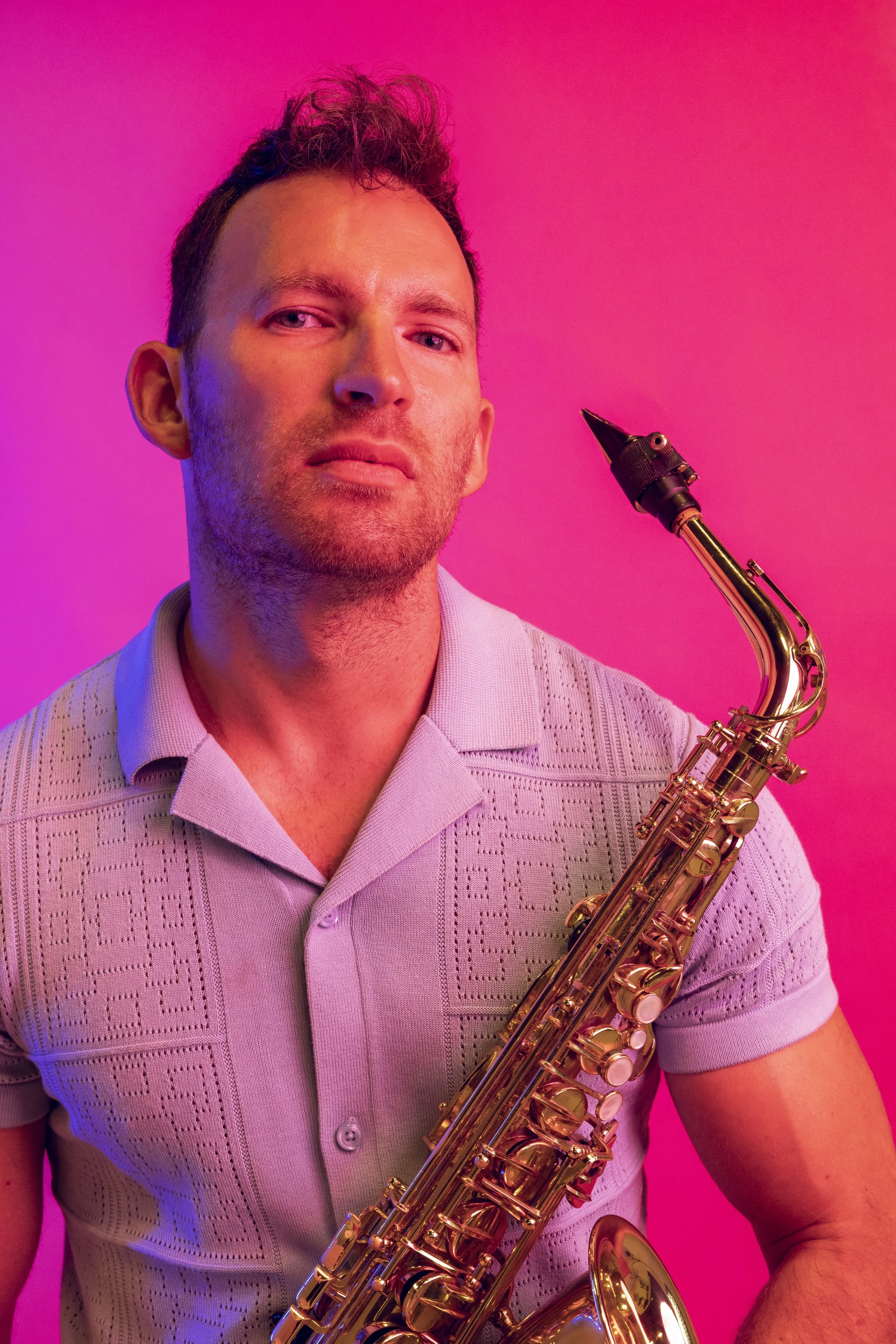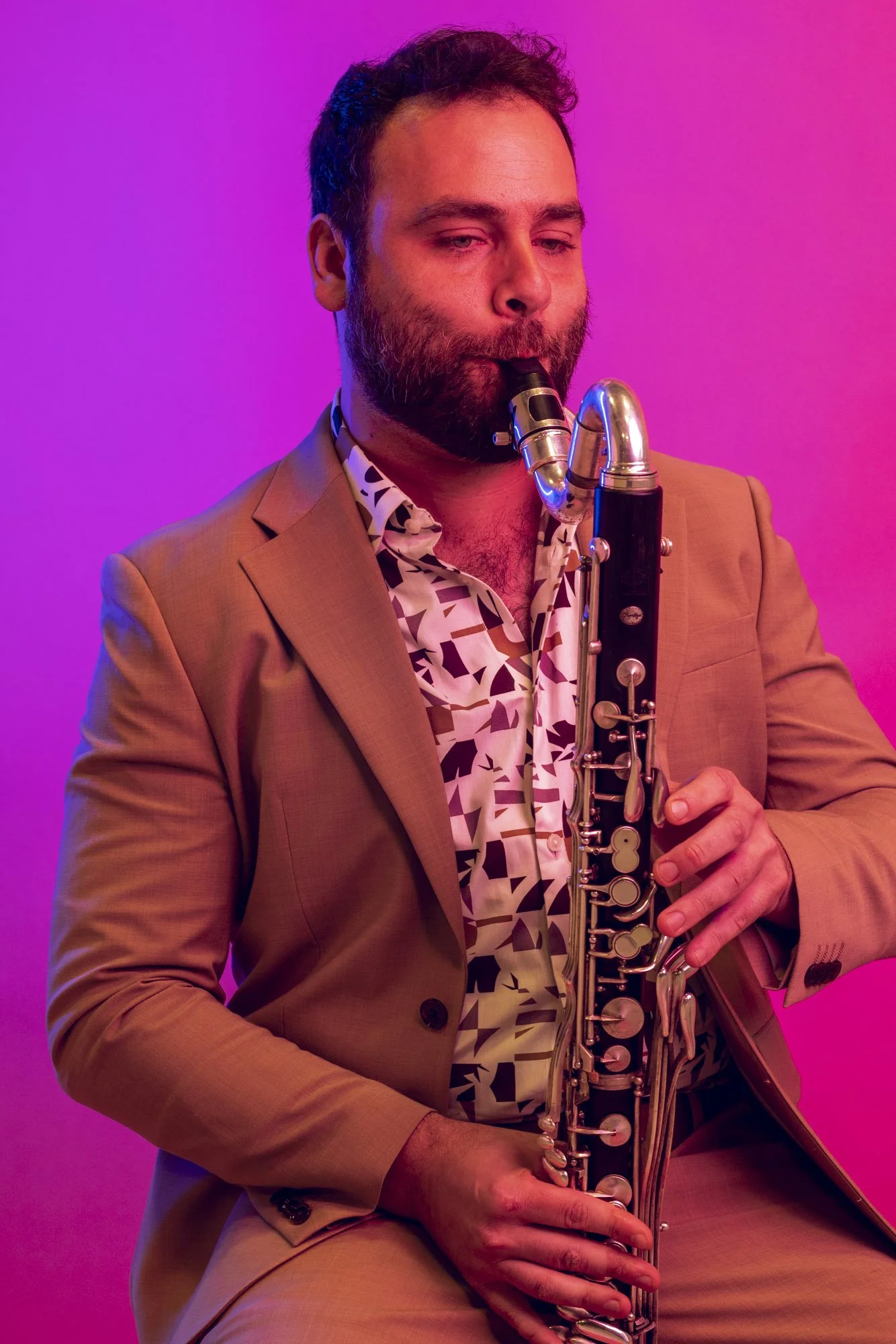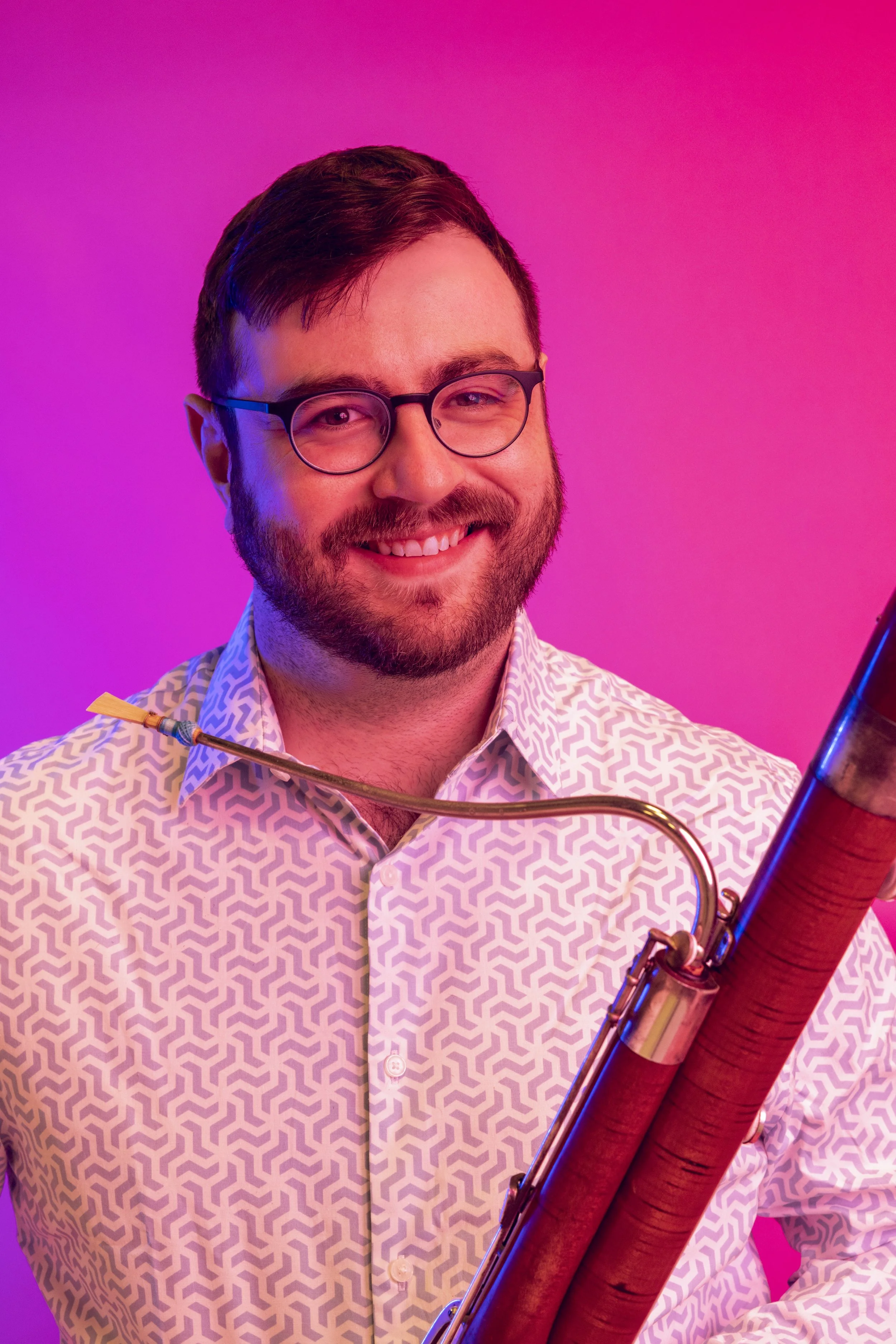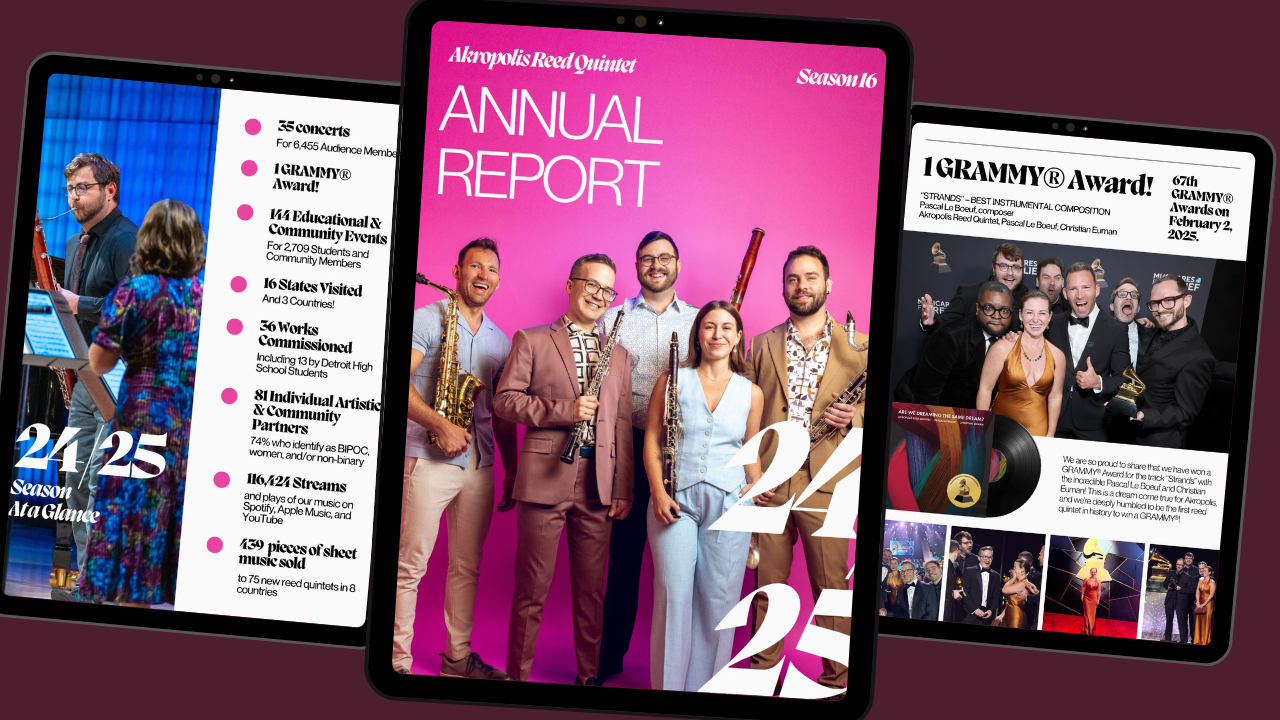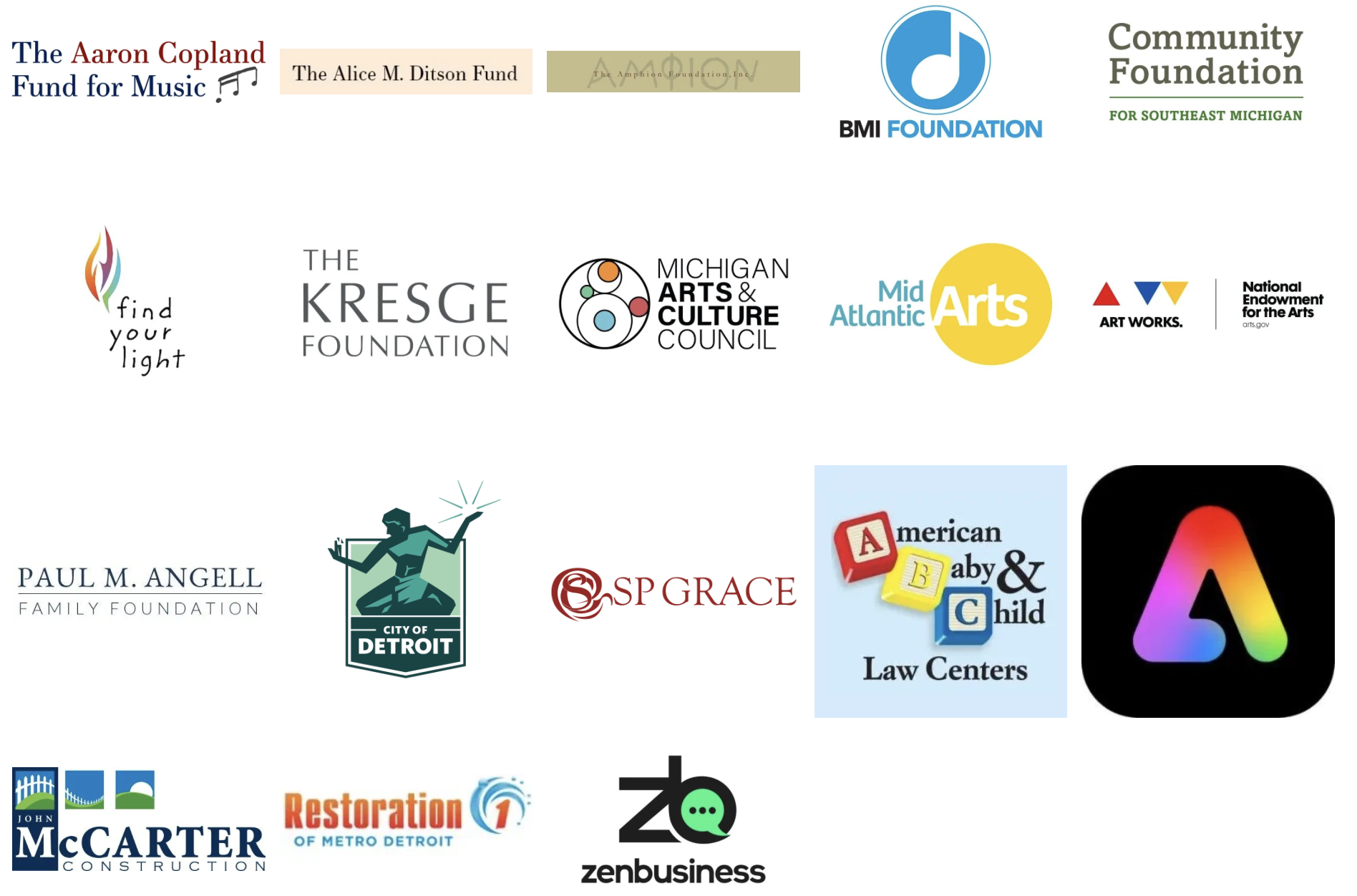DIGITAL CONCERT PROGRAM
OCTOBER 15, 2025
AKROPOLIS REED QUINTET
THE PENNINGTON SCHOOL
We're so glad you're here! As a little thank you for coming to our concert, enjoy this free WAV 88.2K download of the track “Strands” from our GRAMMY® Award-winning album Are We Dreaming The Same Dream? released April, 2024.
Concert
Program
-
From the composer: I first learned about the Venus of Willendorf, a 30,000-year-old, 4.4-inch carved limestone figure found in Austria, in an art history class in 2014, and so it was with tremendous sense of anticipation and excitement that I approached visiting the Natural History Museum Vienna, where the figure is currently exhibited, ten years later. In the same spirit of joyful enthusiasm, I composed Venus of Willendorf for the Akropolis Reed Quintet, a group of musicians who eagerly tackle every musical challenge with artistry and aplomb. The origins of the Venus figurine are mysterious, as is its meaning, though some scholars theorize that it is associated with fertility, growth, and vitality. In response to this theory, I composed exuberant and vigorous music for these talented musicians. Additionally, the Venus is both quite tiny and amply voluptuous, so I often simultaneously feature high notes in the oboe with low notes in the bass clarinet to reflect metaphorical mappings of high sounds with small things and low sounds with large things.
-
I. The living need light
II. Father [TIME]
III. Everything Everywhere All At Once
IV. [TIME] is a Mother
V. The dead need musicThese few specks of time
2025-26 Rome Prize winning composer Oswald Huỳnh provides these notes about his composition:
These few specks of time is an examination of grief, time, and being. Living between two disparate cultures, I have had to reconcile many different identities and values, which has profoundly impacted my creative and moral philosophies. This piece is an exploration of some of those frictions, especially in regard to intergenerational relationships, conflicting ideals between East and West, and how different cultures perceive death. The title of the outer movements (I and V) are derived from a Vietnamese proverb: Sống dầu đèn, chết kèn trống; The living need light, the dead need music. The inner movement (II and IV) are conceptually inspired by two artists, Kendrick Lamar and Ocean Vuong, especially in their confrontations with intergenerational trauma--cultural conflicts between time. The central movement (III) is titled after the 2022 film of the same name, Everything Everywhere All At Once. The melodic material in this work is derived from the Vietnamese folk song, Lý Cái Mơn, which is presented in its full form in the first movement.
-
1
2
3
4
From the composer: "A Soulful Nexus is a transcultural classical work that blends elements of Persian classical music with ornamental vocal techniques found in solo Balkan vocal melodies and the groove-based polyrhythms characteristic of electronic dance music. From Persian classical music, the piece uses an E koron, which to the Western trained ear may sound like a flat microtonal pitch. However, in Persian classical music, a koron is considered its own note, not a microtone between notes. Sonically, this demonstrates how something initially perceived as an imperfection, over time and with change in perspective, can be seen as an aspect of perfection.
Central to A Soulful Nexus is the use of the melodic framework Gushé Shekaste from Persian classical music, which includes the E koron. Shekaste translated means "broken," due to the relationship between the main tetrachord and auxiliary notes of this melodic framework. Throughout the piece, Morakab-Navazie is used to move between Gushé Shekaste and Darâmad Dastgâh-e Mahur and Dastgâh-e Râstpanjgâh. The fourth movement in particular is inspired by Afro-Persian music from Southern Iran. From Balkan music, the piece uses mordents and fragmented motivic phrasing often used by solo vocalists in Bulgarian women's choir music. From electronic dance music, A Soulful Nexus uses cyclical, groove-based polyrhythms to accompany instrumental solos. The title A Soulful Nexus serves as an invitation for listeners and performers to trace the intricate pathways of these musical idioms interwoven throughout the composition."A Soulful Nexus has been made possible by the Chamber Music America Classical Commissioning Program, with generous funding provided by The Mellon Foundation.
-
I. Ghosts of Black Bottom
II. Hastings Street Blues
III. Roho Pumzika Kwa Amani (Spirits, Rest Peacefully)
IV. Paradise Theater Jump!Homage to Paradise Valley was commissioned by and composed for Akropolis in 2019, with support from the Chamber Music America Classical Commissioning Program, with generous funding from The Andrew W. Mellon Foundation.
Paradise Valley, a now-displaced neighborhood of Detroit, Michigan, became of interest to Jeff Scott after he and Akropolis visited the Charles H. Wright Museum of African American History in Detroit, while Jeff's quintet, Imani Winds, was passing through Detroit on tour. Homage to Paradise Valley utilizes Jeff's diverse musical background as a jazz and studio musician in New York City.
"The Valley, the Bottom, and Hastings Street," is a poem by Detroit author Marsha Music, commissioned by Akropolis in 2020 to accompany Jeff Scott's composition. Marsha grew up in the Black Bottom neighborhood. Her father, Joe Von Battle, was a record producer for Aretha Franklin and others. He owned Joe's Records, one of hundreds of music and arts-related cultural centers on Hastings Street.
Comprised of 4 movements, Jeff Scott provides these notes about each movement:
"1. Black Bottom was a predominantly black neighborhood in Detroit, Michigan. The term has sometimes been used to apply to the entire neighborhood including Paradise Valley, which reached from the Detroit River north to Grand Boulevard. In the early 20th century, African-American residents became concentrated here during the first wave of the Great Migration to northern industrial cities. Informal segregation operated in the city to keep them in this area of older, less expensive housing. The name of the neighborhood is often erroneously believed to be a reference to the African-American community that developed in the 20th century, but it was named during the colonial era by the early French settlers because of its dark, fertile topsoil (known as river bottomlands). Black Bottom/Paradise Valley became known for its African American residents' significant contributions to American music, including Blues, Big Band, and Jazz, from the 1930s to '50s. Black Bottom's substandard housing was eventually cleared and redeveloped for various urban renewal projects, driving the residents out. By the 1960s the neighborhood ceased to exist.
2. Hastings Street ran north-south through Black Bottom and had been a center of Eastern European Jewish settlement before World War I, but by the 1950s, migration transformed the strip into one of Detroit's major African-American communities of black-owned businesses, social institutions, and nightclubs. Music was the focal point of Hastings Street, with world-famous jazz and blues artists visiting almost daily.
3. From the Bantu language of Swahili, "Roho, Pumzika kwa Amani" (Spirits, Rest Peacefully) is a lullaby. My humble offering to the many souls who came before me, and preserved through the middle passage, decades of slavery, disenfranchising laws, and inequality. I am who I am because of those who stood before me. May their spirits rest peacefully.
4. Orchestra Hall, where the Detroit Symphony Orchestra now performs, closed in 1939, but reopened in 1941 as the Paradise Theater. For 10 years it would then offer the best of African-American musicians from around the country. Duke Ellington opened Christmas week with his big band, admission was 50 cents, and patrons could stay all day. There were 3 shows every day and 4 on weekends. "B" movies were shown between acts. During the glory days of jazz the Paradise Theater saw Ella Fitzgerald, Billy Eckstine, Billie Holiday, and many more. "Paradise Theater Jump" is dedicated to the famed theater and harkens to the up-tempo style of "jump blues," usually played by small groups and featuring saxophone or brass instruments."
One can learn more about this part of Detroit's history by visiting the Detroit Historical Society website at detroithistorical.org.
ABOUT THE MUSICIANS
TIM GOCKLIN, OBOE
Known for his “remarkably beautiful oboe playing” (Fanfare Magazine), GRAMMY® Award-winning Tim Gocklin is the oboist of the Akropolis Reed Quintet and serves as Artist-in-Residence in Oboe and woodwind chamber music coordinator at the University of Northern Colorado in Greeley, CO. Prior to his present position in Colorado, Tim lived in New Haven, CT and performed in a wide variety of settings with ensembles such as The Orchestra of St. Luke’s, Le Train Bleu, New York Chamber Soloists, Mozart Orchestra of New York under the direction of Gerard Schwarz, the Argus String Quartet, and The Phantom of the Opera on Broadway.
Tim is a two-time winner of the Yale School of Music’s Chamber Music Competition. In 2013, he performed works by Hindemith in Carnegie Hall’s Zankel Hall and Weill Recital Hall as part of the Yale in New York series. He has performed at Chamber Music Northwest with David Shifrin and oboist Allan Vogel in a program of Dvorak’s Wind Serenade, Op. 44 and Mozart’s Gran Partita in B-flat, KV 361. He has appeared at the Caramoor Festival with the Orchestra of St. Luke’s, the Cape Cod Music Festival, the Yellow Barn Music Festival, the Colorado Music Festival under the direction of Peter Oundjian, and held fellowships at the Norfolk and Sarasota Chamber Music Festivals.
Tim can be heard on the NAXOS and Block M record labels, including two recordings with the University of Michigan Symphony Band. These works were taken on a tour to China where the band performed at Beijing’s National Centre for the Arts and Shanghai’s Grand Theatre.
In 2012, Tim received his Bachelor’s degree summa cum laude from the University of Michigan where he studied with Dr. Nancy Ambrose King. He subsequently completed his Master of Music degree and an Artist Diploma at Yale University studying with Stephen Taylor.
KARI LANDRY, CLARINET
Lauded for her "sheer musical imagination" (Gramophone), Kari Landry is a Backun Artist and the clarinetist and founder member of the GRAMMY® Award-winning Akropolis Reed Quintet. A proud small business owner, Kari runs Akropolis’ nonprofit alongside her husband and Akropolis saxophonist Matt, serving as the organization’s Artistic Director and Marketing and Development Manager.
Kari is a fierce advocate for independent and impactful music careers. Since 2016, Kari has taught at the University of Michigan School of Music Theater and Dance in the EXCEL entrepreneurship department, encouraging students to pursue their own artistic ventures and businesses.
Kari was born into a musical Detroit family. Her mother was a bassoonist and her father was a motown studio French Hornist who, among many recordings, can be heard ripping up the intro to the iconic “I Heard It Through the Grapevine” by the legendary Marvin Gaye. As a new mother, she aims to pass on her family's musical heritage to her 16 month old son Theo who has already toured with Akropolis from Atlanta to Amsterdam.
She is an alumnus of The University of Michigan and Eastern Michigan University and has held administrative positions with the University Musical Society (UMS), Ann Arbor Summer Festival, Aspen Music Festival, and The Kennedy Center.
MATT LANDRY, SAXOPHONE
Matt Landry is the GRAMMY® Award-winning Akropolis Reed Quintet’s saxophonist and Executive Director of Akropolis’ 501(c)(3) nonprofit organization. He is one of the most active classical saxophonists in the world today. He has twice appeared on the Classical Billboard Charts and is one of a handful of classical saxophonists to ever perform on the University Musical Society series. He has won 7 national chamber music prizes including the 2014 Fischoff Gold Medal. He was an adjudicator for the 2019 Chamber Music Yellow Springs National Chamber Music Competition and the 2023 NOLA Chamber Fest competition.
Matt has performed in close collaboration with Avery Fisher Career Grant recipients Jennifer Frautschi and the Dover Quartet, as well as clarinetist David Shifrin, BodyVox Dance, soprano Shara Nova, and Grammy-winning trumpeter Kris Johnson. In August 2024 he will present concerts with the Horszowski Trio.
Matt was selected by the Michigan Council for Arts and Cultural Affairs as a 2018/19 Rising Leader among arts and cultural organizations in Michigan. He is a former middle school band director and worked as a community engagement specialist for the Detroit Regional Chamber of Commerce for four years. He has taught two courses for music majors at Michigan State University on entrepreneurship and fundraising and leads dozens of arts entrepreneurship workshops each year at universities nationwide. Matt is responsible for Akropolis’ award-winning projects, including 6 commercially released albums, commissioning more than 150 composers, and receiving grants from the National Endowment for the Arts and numerous other foundations. He has given master classes at more than 50 colleges and leads Akropolis’ Mastermind career development workshop.
Matt received his Bachelor’s degree Summa Cum Laude in Music Education and Saxophone from the University of Michigan, where he studied with Donald Sinta. He was a James B. Angell Scholar and commencement flag bearer.
ANDREW KOEPPE, BASS CLARINET
The Akropolis Reed Quintet’s bass clarinetist and an Ann Arbor, MI native, GRAMMY® Award-winning Andrew Koeppe majored in clarinet at the University of Michigan and studied with Chad Burrow, Deborah Chodacki, and Monica Kaenzig. Andrew can be heard on two University of Michigan Symphony Band albums, including interactions with acclaimed soloists Nancy Ambrose King and Adam Unsworth, as well as the premiere of William Bolcom’s Symphony for Band. He was the featured clarinet soloist in Bolcom’s band orchestration of “Graceful Ghost Rag” on the University of Michigan Symphony Band CD release, Artifacts. He has also performed with the Final Fantasy Symphony in Ann Arbor and with New Music Detroit, performing Annie Gosfield’s Detroit Industry at the Detroit Institute of Arts.
Andrew also attended the Buffet-Crampon USA Clarinet Academy in Jacksonville, FL in 2009 where he studied with clarinetists Eugene Mondie, Dan Gilbert, Andre Moisan, and Ixi Chen. In 2009 he played principal clarinet and bass clarinet in a small orchestral ensemble of select University of Michigan students in a weeklong multimedia workshop and final performance of Ask Your Mama with composer Laura Carpman, curator Jessye Norman, and conductor George Manahan. This new work later premiered at Carnegie Hall.
Andrew enjoys teaching a large and exuberant studio of clarinet and bass clarinet players in Ann Arbor, MI.
RYAN REYNOLDS, BASSOON
Dr. Ryan Reynolds is the Assistant Professor of Bassoon and Chamber Music at the University of North Carolina at Greensboro, where he teaches bassoon, chamber music, reed-making, and graduate practicum courses in instrumental music pedagogy and contemporary techniques. Before coming to UNCG, he taught at Eastern Michigan University in Michigan, Heidelberg University in Ohio, and Miami University in Ohio.
Dr. Reynolds the bassoonist of the GRAMMY® Award-winning ensemble Akropolis Reed Quintet, and is known for his pedagogy, activity within the American chamber music circuit, output as a recording artist, and commitment to creative and collaborative artmaking. An award-winning chamber musician, Dr. Reynolds has won prizes at six national chamber music competitions, including the Gold Medal at the 2014 Fischoff National Chamber Music Competition.
As a member of Akropolis, Dr. Reynolds tours internationally and has released six studio albums with the ensemble. The most recent album, Are We Dreaming the Same Dream?, was released in April 2024 in collaboration with composer/pianist Pascal Le Boeuf and drummer Christian Euman, and won a 2025 GRAMMY® Award. Dr. Reynolds has performed with orchestras throughout the United States including the Detroit Symphony Orchestra, Jacksonville Symphony Orchestra, Dayton Philharmonic Orchestra, and Savannah Philharmonic Orchestra, among others.
In addition to his prolific performance output, Dr. Reynolds served on the faculties of the Renova Music Festival and the Maine Chamber Music Seminar, and currently teaches each summer at the Interlochen Adult Chamber Music Camp and the Akropolis Chamber Music Institute. He has given masterclasses and lectures in Canada, Germany, Spain, the United Arab Emirates, and at many American colleges and universities.
Dr. Reynolds is a graduate of Interlochen Arts Academy, holds a Bachelor of Music (BM) and Master of Music (MM) from the University of Michigan, and a Doctor of Music (DM) from Florida State University. He is grateful to his teachers Eric Stomberg, Jeffrey Lyman, and Jeff Keesecker. Reynolds is a Fox Artist and performs exclusively on a Fox 601 bassoon.

ABOUT AKROPOLIS
Founded in 2009, the GRAMMY® Award-winning Akropolis Reed Quintet is “a sonically daring ensemble who specializes in performing new works with charisma and integrity” (BBC Music Magazine). Comprising five reed players and entrepreneurs unbounded by limits or categorization, Akropolis has graced the Classical Billboard Charts with each of their last three albums, including #2 in April, 2024, and has won seven national chamber music prizes including the 2014 Fischoff Gold Medal. Having premiered and commissioned more than 200 works by living artists and composers, they are pioneers and champions of a new genre of classical music—the reed quintet.
Composed of the same five members that brought about its founding over 15 years ago at the University of Michigan, they are the first ensemble to receive the University's Paul M. Boylan Alumni Award. Akropolis delivers 120 concerts and educational events worldwide each year at luminary series including Tanglewood, Bravo! Vail, University Musical Society, Chamber Music Northwest, and more. Akropolis became the first ever GRAMMY® winning reed quintet with their 2024 album, Are We Dreaming the Same Dream?, in collaboration with Pascal Le Boeuf and drummer Christian Euman, taking home Best Instrumental Composition for the track “Strands” at the 67th Grammy Awards held in February, 2025.
Utilizing their “sheer musical imagination” (Gramophone), the quintet is also known for powerful collaborations with youth and others within its Southeast Michigan community. Certified as a 510(c)(3) nonprofit organization, Akropolis runs a Detroit-based summer festival called Together We Sound, holds an annual, school year-long music composition residencies at Cass Tech, Martin Luther King, Jr., and Detroit School of Arts high schools, and produces a 10-day Chamber Music Institute focused on artist training and mentorship in Petoskey, MI.
Described as “pure gold” by the San Francisco Chronicle, Akropolis Reed Quintet performs worldwide and is represented exclusively by Ariel Artists.
RECENT NEWS
EXPLORE OUR SEASON
WE'D LOVE TO SEE YOU AGAIN!
Support Akropolis
⁎
Support Akropolis ⁎
Did you know Akropolis is also a national recognized nonprofit 501(c)(3) organization? Our mission is to create a more vibrant society with greater accessibility to contemporary music through our quintet’s artistic excellence utilized in performances, educational workshops, and community engagement.
We invite you to learn more about how your support makes a difference here online akropolisquintet.org/give
OR you can donate directly below :)
